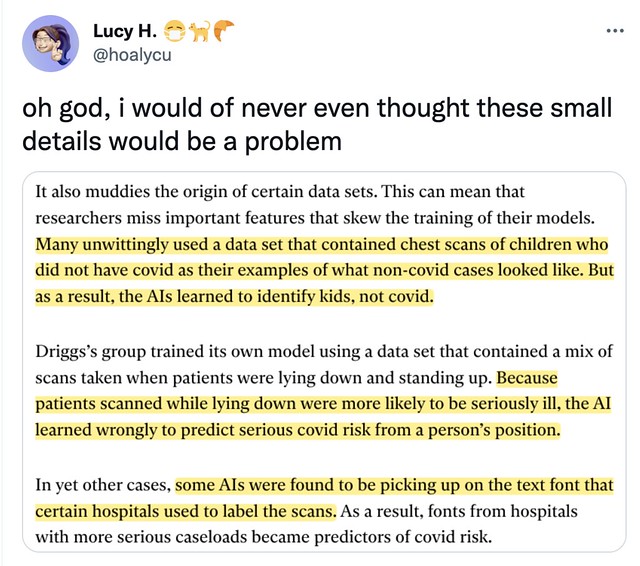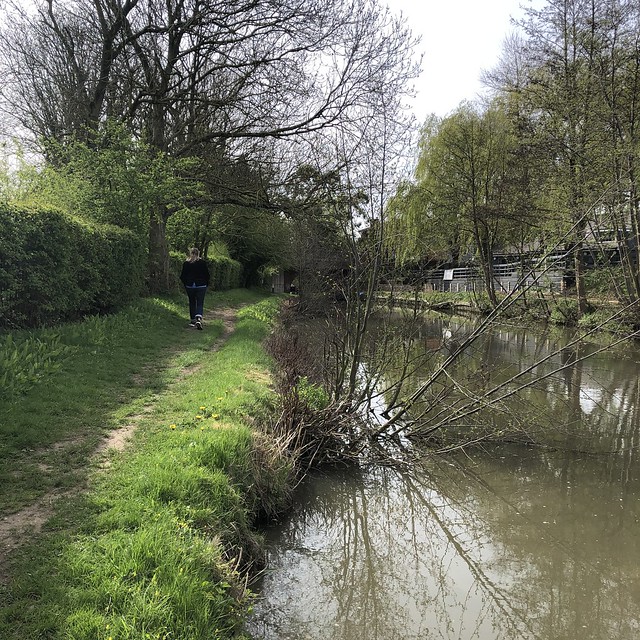For a lot of reasons I think most organisations are going to want less data in the future, not more. Here's another input...
Russell Davies
As disappointed as you are
About | Feed | Archive | Findings | This blog by email
« March 2022 | Main | May 2022 »
Presenter's block
Storythings pointed at this Clive Thompson piece: You don't have writer's block, you have "reporter's block".
It resonated because I was chatting with someone yesterday and was reminded that one of the best way of conquering nerves with a presentation is to do more work. Do more research. Know the topic better.
A lot of organisation set people up to fail when presenting by asking them to talk about something they only understand superficially. This is particularly the case in agencies, consultancies and the like: that's part of the job, to become convincing in an unreasonably quick time. That's a useful skill to learn but it's not a recipe for anxiety-less presenting and it's not a good way for most people to think about their presenting life. And it's a diversity issue.
Your PowerPoint structure can help you organise that knowledge, make sure you're not just sharing proof of work. But feeling bullet-proof about the topic is a great way to feel more comfortable.
April 23, 2022 | Permalink
The draped and the sewn
I love a good bifurcation. I love someone who has the intellectual confidence to divide the world in two. Bosh. This half of the world and this half.
This is a fantastic example, from Worn by Sofi Thanhauser.
"Clothing historian Cecil Saint-Laurent argued that there are two types of clothing: the draped and the sewn. Laurent saw these two types as symbolic of, respectively, Athenian freedom and Spartan fascism, and came down decisively on the side of draped garments. In this position he was preceded by Hegel, who in 1820 declared the aesthetic superiority of draped Athenian garments to sewn German ones:
'Our modern clothing is wholly inartistic: this is because what we really see in it … is not the fine, free, and living contours of the body in their delicate and flowing development, but stretched out sacks with stiff folds … something cut, sewn together over here, folded over there. Elsewhere fixed, and, in short, purely unfree forms."'
April 20, 2022 | Permalink
Charging at Watford Gap
If you've bought a budget EV and spend time on motorways you''ll inevitably spend time waiting for your car to charge.
If you're doing that at Watford Gap it's worth exploring outside the services rather than just staring bleakly at the magazines in Smith's.
Go through the 'picnic area' (Southbound) and cross the bridge. Or just walk through the lorry park (Northbound). You'll find yourself crossing a canal. Go back a bit and look a bit more carefully and you'll find a way down to the towpath. It's not the nicest canal in the world but it's only 5 minutes from the services and it's better than buying a copy of Monocle.
There are cowslips.
Better than Monocle.
April 18, 2022 | Permalink
Disdain / explain
This tweet precipitated a fantastic example of the eternal conversation about PowerPoint.
Also a reminder of what a lot of the world means by 'a poster', which is not what advertising people mean by a poster. (And thinking about it, I should have thought about that when I wrote the book...)
April 17, 2022 | Permalink
We go again
Let's do Interesting again. It's been 4 years. It can be like the World Cup.
I've booked the Conway Hall for 3rd of September and I've updated the twitter bio. That's it so far. Baby steps.
But I'm hoping we can find a bunch of people who've never spoken at an event like this before and give them a big, supportive welcome. That's the plan, at least.
April 13, 2022 in Interesting2022 | Permalink
Grandfathering in
I came across a promotional excerpt for the book Strength to Strength: Finding Success, Happiness, and Deep Purpose in the Second Half of Life:(1)
'Early in life, we have a lot of what psychologists call “fluid intelligence.” That increases through your 20s and 30s—it increases faster if you work harder on it—but it decreases in your 40s and 50s. Fluid intelligence is your ability to work hard with focus and solve problems, your analytic capacity, what makes you a superstar—the hot lawyer, the good surgeon, maybe the incredibly inventive and intelligent electrician. In almost every job, fluid intelligence early on in your life makes you good at what you do, but it decreases as you age.
However, there’s another kind of intelligence that you get later in life called “crystallized intelligence.” That increases through your 40s and 50s. It stays high through your 60s and 70s, and even beyond. Crystallized intelligence is not all about working hard and focusing—it’s about wisdom and passing on knowledge. You get wiser as you get older, which means you know a lot, and you know how to use the information. It also means you’re a much better teacher—the best teachers are older people. So early on, you have fluid intelligence, and later on, you have crystallized intelligence. The trick is to go from fluid to crystallized, to go from innovator to instructor.'
This made sense to me. Obviously that's partly because I'd rather be seen as wise than redundant. So there's a deal of confirmation bias involved. But still.
I think it also explains some of the satisfactions of recent years. I tend to work with people younger than myself. I enjoy it. I think of it as 'they supply the energy, I supply the doubt'. But you could also see it as combining the fluid and the crystalised.(2) Some of my favourite work experiences have been the odd hours spent as an advisor to young businesses or as a mentor to, well, people. (I was going to write 'young people' but thats become a phrase only a politician would use.)
Both of which normally boil down to a cup of tea and a chat.
If anyone would like such a cuppa please let me know.
- I like the subtlety of that formulation, 'the second half of life'.
- Like a damp lump of salt.
April 10, 2022 | Permalink
Emil Richards
For secret reasons I've been researching vibraphonists.
I've even made a play list.
In doing it I came across Emil Richards, a superb, exuberant musician and a legendary session player, a member of the Wrecking Crew.
And, in a fact worthy of one of Tom Whitwell's 52 Things lists, I discovered that Emil is responsible for three of the most memorable sounds of the 20th century: the finger clicks in The Addams Family theme, the bongos in Mission Impossible and the xylophone in the theme for The Simpsons.
That's some career.
April 09, 2022 | Permalink
Oh no
Interesting observation from economist Sassone - time saving software like PowerPoint have potentially reduced company efficiency. Tasks previously conducted by support staff now done by senior executives.
— richard shotton (@rshotton) April 7, 2022
In Marriott column in Times pic.twitter.com/27APu7Jp9K
A reader alerted me to a tweet which leads to an article behind a paywall. More googling leads to a blog post which cites a report which reveals a horrifying fact.
It seems that senior executives are spending time working out how to communicate effectively with their clients and team members.
No wonder everything's going to the dogs.
April 07, 2022 | Permalink
Balance/Tension
A couple of things that I have filed in the same 'folder'. They're, sort of, related.
"“My success in law school, I have no doubt, was in large measure because of baby Jane...I attended classes and studied diligently until 4 in the afternoon; the next hours were Jane’s time, spent at the park, playing silly games or singing funny songs, reading picture books and A. A. Milne poems, and bathing and feeding her. After Jane’s bedtime, I returned to the law books with renewed will. Each part of my life provided respite from the other and gave me a sense of proportion that classmates trained only on law studies lacked.”"
"There is a fundamental tension in the human psyche, says Peter Coleman, between coherence and complexity; he calls it the ‘crude law’ of our existence. We want resolution and closure at the same time as we want interest and novelty. We seek order, and we seek freedom. Problems arise when we feel pushed too far in one direction or the other. Societies that are too ordered become stifling and oppressive; those that have no coherence are unsettling and alienating."



